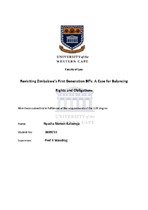Revisiting Zimbabwe's First Generation BITs: A Case for Balancing Rights and Obligations
Abstract
Foreign investments have many benefits; most of which are dependent on the kind of
investment. For host countries, the expected benefits which would arise from their
perspectives include, but are not limited to; technology, knowledge and skills transfer.
Apart from these non-monetary benefits; more directly, a country benefits from increase in
job opportunities, increased competition, and in some cases, increased economic
stimulus. Where greenfield investments are set up, the host country also stands to benefit
in terms of infrastructural development. Also, foreign direct investment (FDI) has been said
to be resilient in times of financial crises. For example, in East Asia, between1997-98, FDI
remained stable as opposed to the down-ward spiralling of portfolio investments.

